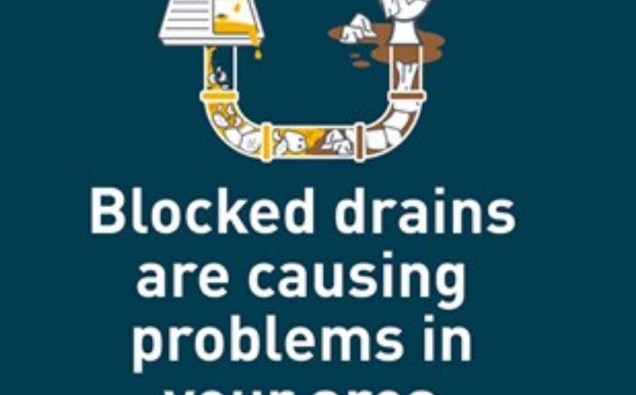Severn Trent is appealing to its customers in Walsall and Wolverhampton to help prevent local sewers from becoming blocked and cause flooding.
Last year alone the water and waste company cleared around 4,700 sewer blockages in the Walsall and Wolverhampton area. Three quarters of these blockages were caused by the wrong items being put down sinks and drains.
What causes a blockage?
There are a few different reasons why blockages occur, but they’re most often caused by leftover cooking fats and oils poured down the kitchen sink, or by items such as wet wipes and sanitary products being flushed down the toilet. These items stick together and over time they build up and block pipes and drains.
Our drains and sewers are only designed to carry human waste, wastewater and loo roll from your toilets and the used water from your sinks, baths and showers. You should put anything else, including wet wipes, nappies or sanitary products, in the bin.
Looking after community – We need your help to prevent local sewers from becoming blocked
Clogged drains or a loo you can’t flush should be the least of your worries, but blockages don’t just cause a problem for you, they can also cause issues for your neighbours too.
Keeping your drains clear is key to avoiding nasty blockages and sewer flooding in your area.
As well as following our easy to follow tips, we recommend you share our easy to follow guides with friends, family or neighbours who may not be aware.
We have downloadable information available at stwater.co.uk/blockages
How to avoid a blockage
There are some really easy actions you can take every day to help protect your drains and keep the sewers flowing for everyone.
Top tips for the kitchen
- Scrape pots, pans and plates into the bin before washing up
- Use kitchen roll to wipe down grease from pans and plates
- Use a strainer in your kitchen sink
- Collect used oil, fat and grease in a container and throw it in the bin
Top tips for the bathroom
- Only ever flush pee, poo and toilet paper.
- Bag sanitary towels and tampons then bin them
- Bin wipes to avoid blocked drains
- Use a bin for unflushables such as nappies, razors, cotton buds and dental floss
Grant Mitchell from Severn Trent explains: “Clogged drains and burst pipes should be the very last thing our customers need to be worrying about at the moment, which is why we’re encouraging everyone to take a few small steps to avoid any unnecessary issues. We know just how important water is and we want to reassure our customers across the county that we’re here to help, but we would really appreciate their support too.
“It’s easy to assume that the warm grease and fat left over from cooking would be ok to put down the sink, as long as you wash it down with a lot of hot soapy water. But the reality is that fats and greases cool and solidify quite quickly once in the pipes, often leading to a serious blockage which can be costly to fix and can cause a big mess. It’s much better to pour any leftover fat, oil, or grease into a container to cool before disposing of it in the bin.
Grant added: “Many customers may not realise that they are responsible for the waste pipe running away from their home up until it either crosses the property boundary or meets with another waste pipe or sewer. It doesn’t take much to cause a blockage and unblocking or repairing this section of pipe can be costly, but it’s completely avoidable if you’re careful about what you put down your drains and bin any unflushables.
“Anyone who has suffered with sewer flooding will tell you that it’s very distressing, unpleasant and costly. But with a few small changes to our daily routine, we can all make a difference and keep the sewers of Walsall and Wolverhampton flowing.”
If you do run into problems, either slow drains or a blocked sewer which is Severn Trent’s responsibility you can report it at www.stwater.co.uk or by calling 0800 783 4444.
To find out more about how to avoiding blockages visit: stwater.co.uk/blockages














